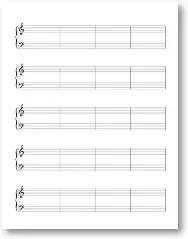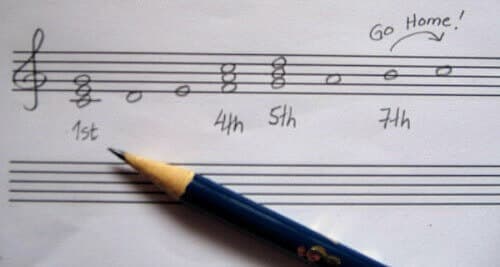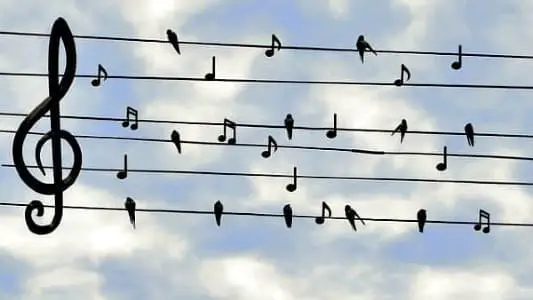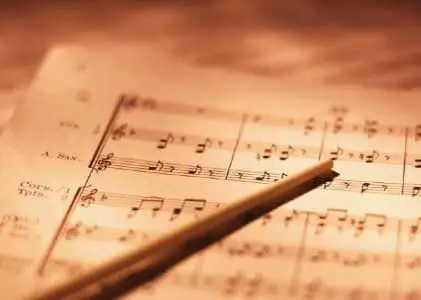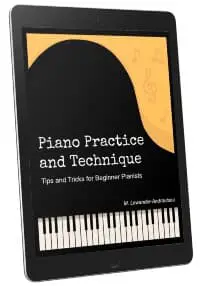- Home
- How to Write Music
- Compose Music
How To Compose Music for Beginners
This article may contain compensated links. Please read the disclosure for more info.
Would you like to learn how to compose music? It is fun and rewarding to write sheet music on your own, and it doesn't need to be hard. We all have to start somewhere, right?
Actually, to start making your own music, the only thing you need to do is to drum your beat, sing your song, or hum your tune...
Yes, that is creating music, and everyone can do it. But if you also would like to get some tools to create music, and write it with musical notation, then this is the right place!
How to compose music - Lessons & exercises for beginners
Here is a series of music composition exercises for beginners, for free, that will teach you some of the techniques used when composing music.
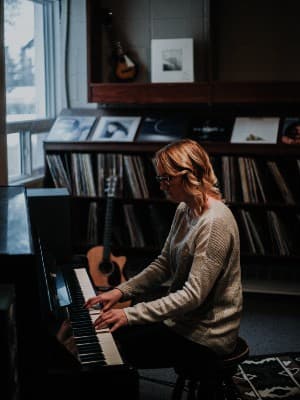
There are probably millions of ways you can create music. But knowing this can sometimes make it even harder to get started.
So, in the following beginner lessons, I will give you some simple exercises to get started right away!
The exercises are designed just to let you get a feel for some of the techniques used when composing music without having had to study music theory for years.
These exercises I also use with my students in music theory class, since they are fun, rewarding, and easy to do!
All the composition exercises are for beginners. Just a few basic music theory concepts are required (see the pre-requisites for each composing lesson).
Hopefully, the exercises will make you hungry for more!
Tip: Make sure to print out some of my free printable staff paper before you begin!
Sharpen your pencil, and practice to write the notes, clefs etc. as you learn about them. This will make everything you learn here easier to remember.
How to compose music for beginners
Learning how music is created and what it is made up of will also make you more aware and appreciate how your favorite composers created the music you love.
Learning how to compose music makes it easier to read notes and may help you play from sheet music better. So, let’s get started!
Introduction: How to write music
- Pre-requisites: None.
An introduction about how to write your own music and how it's something anyone can do. Have a blast! Read more.
Lesson 1: how to write a melody
- Pre-requisites: Musical Notation / Scales /Meter.
In this lesson you will learn how to write a simple melody using a graphic outline, adding pitch, rhythm and finally time signature. It is a great and fun exercise to overcome any writing blocks! Read more.
Lesson 2: How to Add a Chord Sequence to a Melody
- Pre-requisites: Lesson 1 above, music chords.
How do you add chords to a melody? Finding chords to fit a melody is actually easy if you keep it simple. We will look at how to add the three basic chords, the Tonic (I), Subdominant (IV), and Dominant (V), to a short tune. Harmonizing a melody is what you need to have the ingredients for a great arrangement. Read more.
Lesson 3: Simple four part harmony
- Pre-requisites: Lesson 1 and Lesson 2 above, music intervals.
Writing a melody and chords in 4 parts is a fun exercise that really makes you feel the power of music composing!
This is a lesson for beginners who know nothing or little about 4 part harmony. The lesson will end with you having a small but great-sounding composition that you composed! Read more.
Write Your Own Songs
How to write songs
Beginning exercises in popular songwriting. We'll start by analyzing ways many popular songs are composed, and learn about the different parts of a song.
Then, borrowing the same or similar form as your favorite song, you will learn how to compose music! Go to How to Write Songs.
How to Make a Song
Songwriting can be so much fun! Here is an exercise on how to make a song by using the outline of another.
By re-writing a melody but using the same melodic ideas, we can learn more about how a song can be composed while practicing to compose our own. Go to How To Make A Song
Musical inspiration
Musical mysteries and phenomena
Inspiration to compose music can be found everywhere. Here we will take a look at unusual, fun, strange, or simply interesting areas where you might find some inspiration for your own compositions!
Enjoy a look into odd and obscure mysteries and phenomena of sound and music, going back to the history of music theory. Read more.
